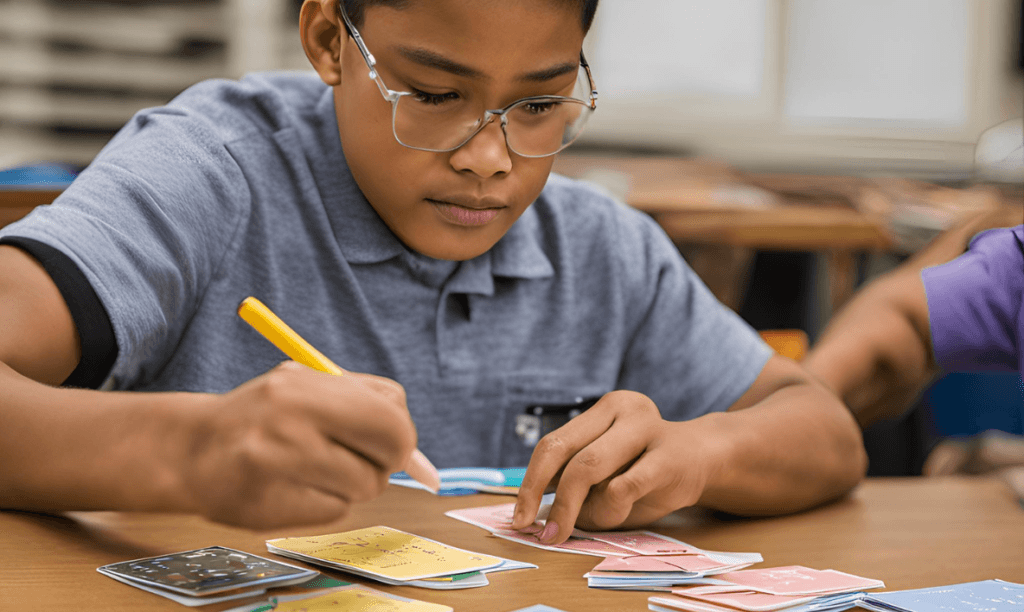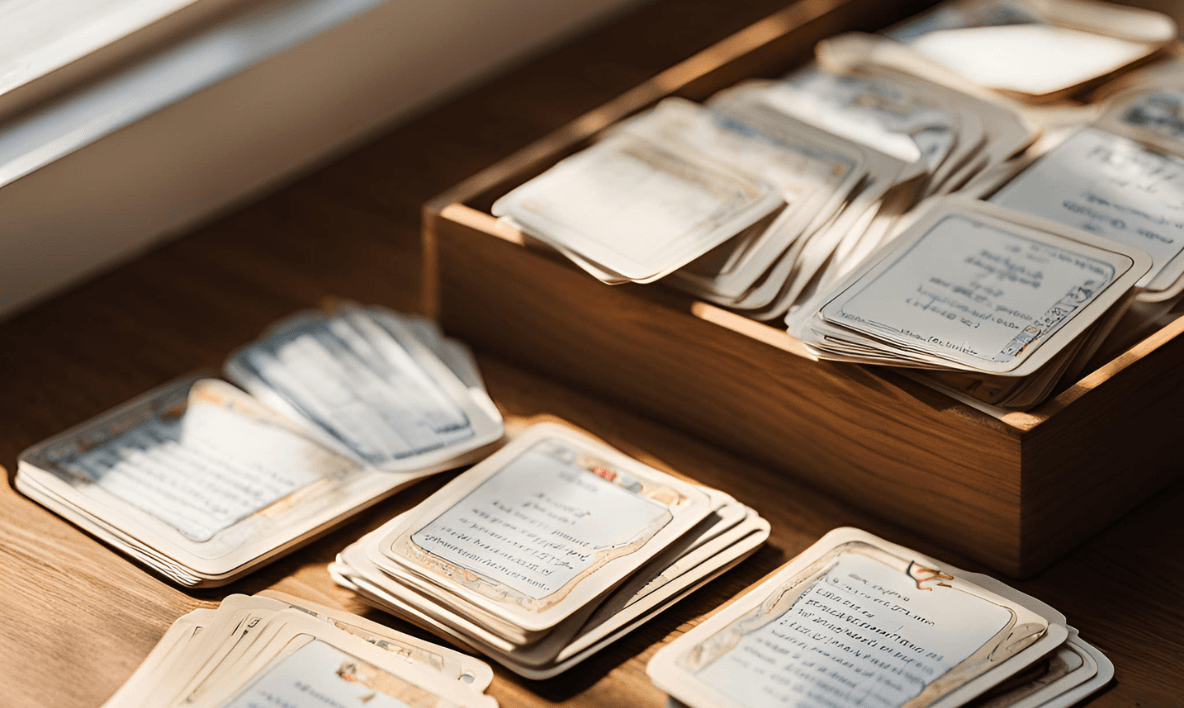Flashcards are one of the most effective tools for vocabulary building. They’re simple, portable, and versatile, making them ideal for learners of all ages. Whether you’re an adult preparing for an exam like the IELTS or a teacher working with ESL students or kindergarteners, flashcards can significantly accelerate vocabulary retention.
In this article, you’ll learn how to use flashcards effectively to build vocabulary, explore various ways to make them, and discover how to personalize them for different learning needs.
Introduction
Vocabulary flashcards are an excellent tool for memorizing and retaining new words. Whether you are a student, an ESL learner, or someone looking to improve their language skills, flashcards provide a structured and effective way to learn.

Why Flashcards Are Effective for Vocabulary Building
Flashcards are effective for building vocabulary because they engage multiple senses—sight, touch, and sometimes hearing. By reviewing flashcards repeatedly, you reinforce memory connections in your brain. Here are some reasons why flashcards work so well:
- Active Recall: You are forced to actively remember the word or its definition, strengthening memory.
- Spaced Repetition: Flashcards allow you to review words regularly, which is key to long-term retention.
- Portable: You can take flashcards anywhere, making it easy to practice on the go.
Quote: “Flashcards provide an interactive and engaging way to reinforce vocabulary learning through active recall.”
How to Make Vocabulary Flashcards
Creating your own vocabulary flashcards is simple, but the effectiveness depends on how you design them. Here are three ways to make effective vocabulary flashcards:
1. Basic Vocabulary Flashcards
How to Create:
- Write the vocabulary word on one side of a card.
- Write the definition, part of speech, and an example sentence on the reverse side.
- Review these cards daily.
Key Takeaway: “Basic vocabulary flashcards offer a simple yet powerful way to build a strong vocabulary foundation.”
2. Flashcards with Pictures
How to Create:
- Add an image that represents the word on one side of the card.
- Write the word and its definition on the other side.
- Visual learners benefit from associating images with vocabulary words.
Key Takeaway: “Flashcards with pictures make abstract words easier to understand and remember, especially for younger learners.”
3. Digital Vocabulary Flashcards
How to Create:
- Use apps like Anki, Quizlet, or Memrise to create digital flashcards.
- These apps often use spaced repetition algorithms to help you review words at optimal intervals.
- Digital flashcards are great for on-the-go learning.
Quote: “Digital flashcards are perfect for tech-savvy learners who want to practice anytime, anywhere.”
Using Flashcards for Different Learner Levels
Flashcards can be customized to suit learners at different levels. Here’s how to use flashcards for various student groups:
1. Flashcards for Adults
For adult learners, flashcards should focus on advanced vocabulary and context:
- Include sophisticated words relevant to your goals (e.g., professional language or exam preparation).
- Add example sentences using the word in context to help with application.
- Use digital flashcards for convenience and tracking.
Key Takeaway: “Flashcards for adults should include advanced words and contexts to meet specific learning goals.”
2. Flashcards for ESL Students
Flashcards are ideal for ESL students who are learning English as a second language:
- Use simple definitions or translations in the student’s native language.
- Include pictures to help with word associations.
- Focus on practical, everyday vocabulary that students can immediately use.
- Best Reading Books for Vocabulary Building
3. Flashcards for Kindergarten
For young children in kindergarten, flashcards should be fun and engaging:
- Use colorful pictures that represent the words.
- Focus on basic, easy-to-understand words (e.g., animals, objects).
- Include simple phonetic spelling to help early readers sound out words.
Quote: “Flashcards for kindergarten should be colorful, simple, and playful to keep young learners engaged.”
Flashcards for Exam Preparation (IELTS, TOEFL)
Flashcards are incredibly helpful for exam preparation, especially for vocabulary-heavy tests like the IELTS and TOEFL. Here’s how to create effective flashcards for exam prep:
- Choose High-Frequency Words: Focus on words that commonly appear in IELTS or TOEFL exams.
- Use Example Sentences: Include a sample sentence showing how the word is used in context.
- Incorporate Synonyms and Antonyms: Add related words to expand your understanding and make connections.
Best Practices for Using Vocabulary Flashcards
Here are some best practices to get the most out of your vocabulary flashcards:
Use Spaced Repetition:
- Space out your reviews to reinforce memory.
- Digital apps like Anki are perfect for this.
Incorporate All Learning Styles:
- Combine words, pictures, and sounds in your flashcards to engage multiple senses.
- Try reading the word aloud or recording yourself saying it.
Practice Daily:
- Dedicate a few minutes each day to reviewing your flashcards.
- The consistency will help reinforce your learning.
Make Flashcards Portable:
- Keep a small set of flashcards with you and review them when you have spare time, like during a commute or while waiting in line.
Involve Others:
- Have a friend or family member quiz you with the flashcards.
- Collaborative learning can make the process more interactive.
Conclusion
Flashcards are an incredibly versatile and powerful tool for building vocabulary quickly and efficiently. Whether you’re an adult studying for exams, an ESL student, or a teacher working with young children, flashcards can adapt to your learning style and needs. With regular practice and spaced repetition, you can significantly improve your vocabulary and retain new words for the long term.
FAQs
Q: How often should I review my flashcards?
A: It’s best to review your flashcards daily, especially if you’re trying to build vocabulary quickly. Using spaced repetition software can help optimize your review schedule.
Q: Can I use flashcards for exam preparation like IELTS?
A: Absolutely! Flashcards are a great tool for memorizing high-frequency words and improving your vocabulary for exams like the IELTS.
Q: Are flashcards effective for young learners like kindergarten students?
A: Yes, flashcards with pictures are especially effective for young learners as they help make abstract concepts more concrete.
For more strategies on vocabulary building, check out our effective vocabulary games.

